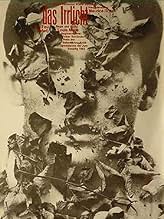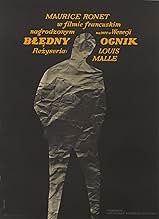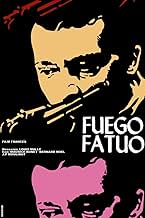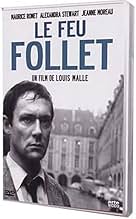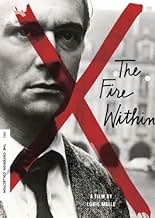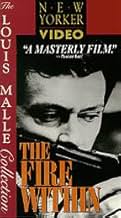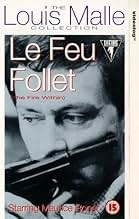Depressed Alain Leroy leaves the clinic where he was detoxified. He meets friends, acquaintances and women, trying to find a reason to continue living. Will this help him?Depressed Alain Leroy leaves the clinic where he was detoxified. He meets friends, acquaintances and women, trying to find a reason to continue living. Will this help him?Depressed Alain Leroy leaves the clinic where he was detoxified. He meets friends, acquaintances and women, trying to find a reason to continue living. Will this help him?
- Director
- Writers
- Stars
- Awards
- 2 wins & 2 nominations total
René Dupuy
- Charlie
- (as René Dupuis)
- Director
- Writers
- All cast & crew
- Production, box office & more at IMDbPro
Featured reviews
"The Fire Within" (French, 1963): Directed by Louis Malle, scored by Eric Satie. This is a perfect visual reason to use black and white with tons of gray. It is two days in the life of a young, popular man who has returned to his acquaintances, friends and ex-lovers, after vanishing into a program for alcoholics
a program he found comforting, and did NOT want to leave. He searches through his relationships for a reason to continue his life, whether as-is or anew
but overriding any thoughts of the future is his current state of total depression. His friends continued their lives during his absence, they continue their fast-paced, challenging repartee during his visits, and they will clearly continue after his leaving. "The Fire Within" is a quiet, observational film, interrupted only for conversations that seem to have substance, yet offer no solutions. It has one goal, and meets it very well.
Wonderful study of the last day in the life of a man. This movie has one specific scene where Alan Leroy (Maurice Ronet), sitting at a cafe in Paris, takes his first alcoholic drink after months of rehabilitation. This scene is complimented by stunning photography of Chislain Cloquet and the haunting music of Eric Satie. Malle captures the true meaning of existentialist philosophy and manages to create a movie that does not wallow in self-pity but instead celebrates our ability to choose whether to live or die.
One of the triumphs of the otherwise often overrated nouvelle vague,Louis Malle's adaptation of a Drieu de la Rochelle has not aged bit.Thanks to Maurice Ronet ,who portrays a suicidal man,probably the most beautiful performance of this kind.The movie is nothing but a long wandering in a mental hospital,in the Parisian bistros,in the posh world where an Antonioniesque bourgeoisie is killing time (see Alexandra Stewart's character).If I mention Antonioni,it''s not by chance ;actually Malle succeeds here where Antonioni only partially does.The difference ,I think,lies in the fact that we have here a human being,made of flesh and blood,who exists,and I would like to point out once again what a great actor the late Maurice Ronet was.Eric Satie's music perfectly captures the doomed atmosphere.This is arguably Louis Malle 's finest,one of the rare movies which achieve the delicate balance between the strong screenplay and the "liberties" dear to the new wave creators. Yes the new wave did produce great movies:"la tête contre les murs " (Franju)"Cléo de 5 à 7" (Varda)"Lola" (Demy)and this one are jewels on its crown.
THE FIRE WITHIN chronicles the last chapter in the life of a failed writer who is locked in a struggle with existential despair. Alain Leroy is presently in a hospice undergoing treatment for alcoholism, and he is clearly hung-up on the same dilemma that perplexed Shakespeare's Hamlet-should he continue with his lackluster existence, or end the hopelessness of it all? Always the ladies man, he now feels that he was never able to touch or connect with any of the passions of his nature, and alcohol allowed him a safe haven while he awaited his real life to commence. But, it never did. He spends his last few days visiting with old friends trying to uncover an answer to his problem, but finds no solace in their warmth and encouragement. The film follows the premise to the logical conclusion, but whether we were watching the buildup to a suicide was really not the prime concern of the movie. Malle's film succeeds in that he is able to present a three dimensional character at a significant crossroads in his life. Also, the film contains many wonderful scenes of Paris street life from the early 1960's which further increases the richness of this movie.
10paula-60
This is a mesmerising film about suicide as a rational way out. Ronet is wonderful in the role, sweetly sad, boyishly charming, tragically self-aware. His loving, well-meaning friends he visits on the way to the final "checking-out" are an interesting study and their inability to connect with Ronet or perceive where he's heading is poignant. For me, the best Louis Malle ever. The choice of music is great as well.
Did you know
- TriviaFor the first two days, filming was done in color. However, director Louis Malle realized that this was a distraction from the story, so he decided to film in black-and-white. An assistant also later declared that the shooting atmosphere on the set was rather gloomy.
- GoofsAs Alain walks on the streets of Paris, the crew (pushing the dolly) is visible on the shop windows he passes by.
- Quotes
Alain Leroy: I'm killing myself because you didn't love me, because I didn't love you. Because our ties were loose, I'm killing myself to tighten them. I leave you with an indelible stain.
- SoundtracksTrois Gymnopédies
Written by Erik Satie
- How long is The Fire Within?Powered by Alexa
Details
- Release date
- Country of origin
- Official site
- Language
- Also known as
- A Time to Live and a Time to Die
- Filming locations
- Production company
- See more company credits at IMDbPro
- Runtime
- 1h 48m(108 min)
- Color
- Sound mix
- Aspect ratio
- 1.66 : 1
Contribute to this page
Suggest an edit or add missing content

![Watch Bande-annonce [OV]](https://m.media-amazon.com/images/M/MV5BODdiNzczOTktMmMxMC00ZGQ0LTg4YWItZWEzN2FkZTViODk1XkEyXkFqcGdeQXRyYW5zY29kZS13b3JrZmxvdw@@._V1_QL75_UY281_CR0)
